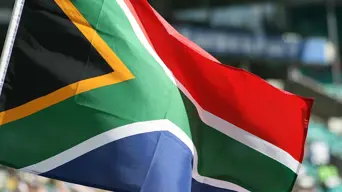'We're not a poor country, just poorly managed' - UFS Chancellor Bonang Mohale
Bruce Whitfield interviews Prof. Bonang Mohale as we 'celebrate' Workers' Day 30 years into democracy.

South African flag.Picture: Wikimedia Commons/CC-BY-SA-2.5
It's ironic that we're celebrating Workers' Day 30 years into democracy, and a higher proportion of us than ever are looking for jobs, comments Bruce Whitfield on The Money Show.
Why is it so difficult for South Africa to make those choices that will spur economic growth and result in more jobs?
A very recent example of how uninvestable the country's becoming, is the recent offer by BHP Billiton to buy out Anglo American, without its South African assets.
RELATED: BHP wants to buy out Anglo American, but with SA assets excluded
Whitfield discusses the state of SA Inc. with Professor Bonang Mohale,Chancellor of the University of the Free State.
While South Africa is back in the Number One spot as the biggest economy in Africa, this position is undeserved says Prof. Mohale.
"The 2024 IMF World Economic Outlook estimates that Nigeria has now relinquished its spot and it's now Number 4... Fortunately, and undeservedly, South Africa is now Number at $373 billion, so the 21 billion growth is less than GDP."
Professor Bonang Mohale,Chancellor of the University of the Free State
RELATED: IMF paints bleak picture for SA economic growth, but is it ignoring progress that IS happening?
He notes that we're the only country in Africa that became free from colonialism but did not increase substantially our education level, or even improve the ownership of the economy by the indigenous black people.
"It's becoming abundantly clear that we didn't think deeply about what we're going to do with the political office to fundamentally restructure this economy so that it looks like us."
Professor Bonang Mohale,Chancellor of the University of the Free State
If wealth is an inevitable outcome of both hard work and enterprise, then every woman in Africa should be a billionaire, says the prof.
"It should worry us that, 30 years into democracy, poverty still has primarily a black and feminine face."
"In fact for the last half of these 30 years, South Africans have become poorer as their discretionary purchasing power and disposable income have actually gone backwards. The rand buys less now than compared to the same period ten years ago."
Professor Bonang Mohale,Chancellor of the University of the Free State
Launching into the long list of things the country has to fix, Mohale highlights that we need to accept that we've now been characterised by greed.
This means we must must root out and defeat state capture, which he says is still present and ubiquitous.
'We're not a poor country, just poorly managed', he summarises.
Professor Mohale believes strongly that business should stop funding political parties commensurate to their representation.
"They should fund only those politcal parties and individuals for the first time in the history of this country who might sign up to no more than just five things..."
"...transformation, ethical leadership, good governance, service delivery and then law and order, safety and security."
Professor Bonang Mohale,Chancellor of the University of the Free State
Scroll up to listen to the conversation with Prof. Mohale